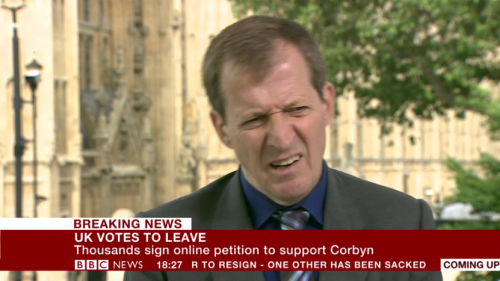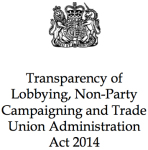The call for a new centrist party in the UK to counter Jeremy Corbyn’s leftist politics, despite the call-to-arms it represented to youth around the country boosting voter turnout, and Theresa May’s hard Brexit stance is striking and the argument being made comes from left, right, and center.
“We need a pro-Remain party that will pose as a strong opposition to Conservative! We need the Liberal Democrats but without the emotional baggage from the 2010 coalition government! What we truly need is a party for the pro-Remain liberal Tories, for the soft-left Labourites, for, well, the Liberal Democrats! Someone to represent the former ‘establishment’ demographic now left politically homeless by ideologically-driven factions on both sides of the political spectrum.”
And so on.
The rhetoric does make sense if you too are disappointed by the current state of British politics. I can’t quite make my mind up on it. Theresa May’s government is just omnishambles but since the election in June, I have been able to make some light of the dire situation Britain’s in: Ed Miliband continues to delight Twitter with little hors d’oeuvres of joy – Tory-roasting, Doctor-defending, BBC radio show hosting, and so on. He posted a picture of himself with a dog called Winston, for Christ’s sake!

Meanwhile I have recently discovered via a rather obscure interview from newly ‘elected’ Lib Dem leader Vince Cable that former Chancellor of the Exchequer and juggling enthusiast George Osborne possibly voted Lib Dem in the last election. That, coupled with the vitriol Osborne directs towards her government on an almost daily basis in the Evening Standard, his gleeful comment on the Beeb that Theresa May post-election was “a dead woman walking”, and the knowledge that Osborne’s own son canvassed for Cable in Twickenham in the run-up to the election, is confusingly heartwarming.
Now, heartwarming is not an adjective I would normally be prepared to use to describe my feelings on the former Chancellor but perhaps too much time has been spent this summer reading up on Peter Mandelson and what possibly happened in Corfu.
Getting back to the question being asked of us all. Do we really need a fresh new Remain party on the centre left? There are existing left-wing alternatives to the main two-party system we have in Britain. Take the Green Party. Electorally unsuccessful everywhere except in Brighton, they, like the Lib Dems, wanted a second Brexit referendum or, at the very least, a final vote on the outcome of the Brexit negotiations. Why can’t we vote them in across the country? They want to get climate change on the national agenda, to lower the voting age to 16, to end the housing crisis. With the exception of climate change which was hardly talked about this General Election, these are issues on which there is a consensus on across the Left this general election.
But surely the reason why Greens have been so ‘unelectable’ is that Britain is still a centrist country with a heavily right-wing media and the Greens are not centrist enough to throw away their principles in order to gain electoral momentum nationally. (The Green Party tend to do very well in local elections, running local councils and the like).
My answer to this is, unsurprisingly, New Labour.
The most electorally successful party in the country’s political history was New Labour with a sustained majority seen through 3 elections from 1997 until 2010. Despite the political baggage both Labour and Tony Blair still carry from their adventures in the Middle East, you have to admire the Labour Party’s mordernisation project that Kinnock started and Blair finished. It won seats. A lot of seats. Why? One reason is that Blair and his director of communications Alastair Campbell acknowledged the way things simply were in Britain. A two-party system with a right-wing press and centrist voters tired of Conservative politics but not necessarily of Tory policies.
It is not exactly admirable the way New Labour sucked up to Rupert Murdoch to gain control over the press nor was it exactly admirable that the introduction of market forces to the NHS truly began under the Blair years which would then set in motion the move towards privatisation. Neil Kinnock nearly threw a kettle of hot water onto Campbell when he found out about their relationship with Murdoch but to have gained the number of seats they did, grudgingly, I admit it had to be done. They had to game the system.
That’s what we, as voters, have to do now. Tactical voting, which increased this year due and brought back the two-party system, is one way of doing.
This is the other. Instead of creating a new party on the left and exacerbating the bane of the Left’s existence (i.e. smaller parties splitting the vote), we should create a socially liberal centre-right party designed to split votes on the right. A new thorn in the side of the Tories. Now with UKIP decimated, this is what the Tories need to make a return to more sensible politics. With the former UKIP-voting demographic finding comfort in the Labour Party once more with their ambiguous, sexually confused stance on Brexit, a centre-right party could attract swathes of centrist Tories who feel alienated by May’s overemphasis on a hard Brexit (a line that she has taken to appease hard-right MPs in her party) or heartbroken over the colossal cock-up that was her election campaign. Maggie 2.0 was not to be. Thank God.
This could be the Right’s SDP-Liberal Alliance. At one point, it was thought that the SDP-Liberal Alliance in the 1980s, a product of the moderate left’s unease with the hard left’s control over the party at the time, would eventually overtake Labour and firmly replace it in the years to come. Political spinoff parties like the SDP-Liberal Alliance rarely any long term success and would not inflict any lasting damage on the Labour Party but it will provide the necessary discourse that the Brexit negotiations currently need.
Now, you may say to me: “Alena, New Labour worked as a centrist party and knew how to monopolise votes but that was 20 years ago. Surely, the model you’re using is dated. People aren’t centrist voters anymore. Young people love Jeremy Corbyn’s brand of honest left-wing politics.”
I have thought about it and it is a valid point. The reasons why so many of the electorate, especially young voters, were mobilised to vote (and vote Labour) this election were:
New Labour was British politics at its most Machiavellian and problematic. “Get it away from me,” you might say, brandishing a long wooden stick, ready to take your swing at New Labour, like many others, for causing all of your life problems.
I don’t blame you. It was, for two decades, the cause of Britain’s voter apathy, from complacency to generating an increased mistrust of politicians. Corbyn is a chance to break away from the tainted image of the soft left in the party who have compromised their principles for pragmatism. It is a good argument and hopefully Labour can continue winning seats and recapture its fighting spirit to win the next election.
(Heads up: Principles vs Pragmatism is yet another installment in Thought Process)
But if there are people still upset by Corbyn’s politics but don’t like the Conservatives, can’t trust the Lib Dems, don’t think the Greens are capable of winning more seats, perhaps we should welcome a new centre-right party in British politics just for the sake of discourse?
Of course, there are many issues with the all-encompassing and somewhat useless term “centrist”.
It throws well-meaning left-wing moderates in with neoconservatives like George Osborne and, in turn, encourages the notion that moderate centrists are why we have bad politics today. The toxic atmosphere of American politics in 2016 is an example of this. To be fair, many people who are compassionate and progressively-minded individuals see themselves as “centrists” even though they are generally in favour of left-wing economics and are potential political allies. It does no one good to shun them away for occupying the centre-ground. It just opens up a way for right-wing parties to fill the political void while the Left bicker.
But there you go. I never thought I would be saying this but a new centre-right party is what the Left and the British public needs.
At least until the Labour Party runs like a well oiled machine as it once did twenty years ago under Tony Blair but this time with Jeremy Corbyn at the very heart of it.
After finishing off this post, I went on Twitter, only to find that there are rumours that Blair and Osborne might start a new centrist party. This is not what I wanted. [throws chair] THIS IS NOT WHAT I WANTED. Not with those people.
Why did I write this post?






